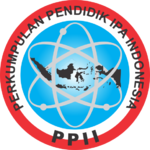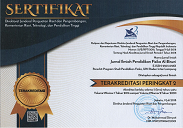Students Scientific Attitude in Learning Physics using Problem Based Learning Model with Experimental and Project Methods
Abstract
Keywords
Full Text:
PDFReferences
Anwar, H. (2009). Penilaian Sikap llmiah dalam Pembelajaran Sains. Jurnalpelangi Iimu, 2(5), 103–113. http://ejurnal.ung.ac.id/index.php/JPI/article/view/593/544
Amelia, R., Supriyati, Y., & Indrasari, W. (2019). the Effect of Sets Learning Model and Scientific Attitude Toward Student ’ S Physics Achievement. 8(1), 375–382.
Arikunto, S. (2010). Dasar-dasar Evaluasi Pendidikan Edisi Dua. Jakarta: Bumi Aksara.
Arini, A. N., Hartono, & Khumaedi. (2018). Analysis of Problem Solving Skills and Students Scientific Attitudes through the Implementation of Problem Based Learning Module. Journal of Innovative Science Education, 7(2), 68–75.
Azhari, S., Suastra, I. W., & Sudiatmika, A. A. I. A. R. (2020). Hubungan antara Motivasi Belajar dan Sikap Ilmiah Dengan Prestasi Belajar Fisika Siswa Kelas XI IPA SMA Negeri 2 Denpasar. Jurnal Pendidikan Fisika Undiksha, 10(2), 91. https://doi.org/10.23887/jjpf.v10i2.28688
Azmi, M. K., Rahayu, S., & Hikmawati, H. (2017). Pengaruh Model Problem Based Learning dengan Metode Eksperimen dan Diskusi Terhadap Hasil Belajar Fisika Ditinjau dari Sikap Ilmiah Siswa Kelas X MIPA SMA N 1 Mataram. Jurnal Pendidikan Fisika Dan Teknologi. https://doi.org/10.29303/jpft.v2i2.294
De Jong, T., & Van Joolingen, W. R. (1998). Scientific discovery learning with computer simulations of conceptual domains. Review of Educational Research, 68(2), 179–201. https://doi.org/10.3102/00346543068002179
Djamarah, S.B., & Zain A. (2010). Strategi Belajar Mengajar. Jakarta: Rineka Cipta.
Duch, B. J., Allen, D. E., & Groh, S. E. (2001). The Power of Problem-Based Learning. New Directions for Teaching and Learning.
Hilalliati, N., Jumadi, Wilujeng, I., & Kuswanto, H. (2019). Scientific Attitudes Mapping of Students after using PhEt Assisted Group Investigation Models. Journal of Physics: Conference Series, 1233(1). https://doi.org/10.1088/1742-6596/1233/1/012050
Istikomah, H., Hendratto, S., Bambang, S. (2010). Penggunaan Model Pembelajaran Group Investigation Untuk Menumbuhkan Sikap Ilmiah Siswa. Jurnal Pendidikan Fisika Indonesia, 40–43. https://doi.org/10.15294/jpfi.v6i1.1101
Khairunnisak. (2018). Peningkatan Pemahaman Konsep Dan Motivasi Belajar Siswa Melalui Simulasi Physic Education Technology (PhET). Jurnal Penelitian Pendidikan Ipa, 4(2).
Kurniawan, D. A., Astalini, A., & Sari, D. K. (2019). An evaluation analysis of students’ attitude towards physics learning at senior high school. Jurnal Penelitian Dan Evaluasi Pendidikan, 23(1), 26–35. https://doi.org/10.21831/pep.v23i1.20821
Lestari, D. I., & Projosantoso, A. K. (2016). Pengembangan media komik IPA model PBL untuk meningkatkan kemampuan berfikir analitis dan sikap ilmiah. Jurnal Inovasi Pendidikan IPA. https://doi.org/10.21831/jipi.v2i2.7280
Maulidah, S. S., & Prima, E. C. (2018). Using Physics Education Technology as Virtual Laboratory in Learning Waves and Sounds. Journal of Science Learning, 1(3), 116. https://doi.org/10.17509/jsl.v1i3.11797
Muriithi, E. M., Odundo, P. A., Origa, J. O., & Gatumu, J. C. (2013). Project Method and Learner Achievement in Physics in Kenyan Secondary Schools. International Journal of Education and Research, 1(7), 1–12.
Nugraha, I., Putri, N. K., & Sholihin, H. (2020). An Analysis of the Relationship between Students’ Scientific Attitude and Students’ Learning Style in Junior High School. Journal of Science Learning. https://doi.org/10.17509/jsl.v3i3.22873
Okyranida, I. Y., Suparmi., & Aminah, N. S. (2017). Pembelajaran Fisika Problem Based Learning (PBL) Menggunakan Metode Eksperimen dan Metode Proyek Ditinjau dari Kemampuan Berpikir Abstrak dan Kemampuan Berpikir Kreatif Siswa SMP/MTs Kelas VIII Materi Cahaya. Jurnal Inkuiri, 6(1), 91-102. https://jurnal.uns.ac.id/inkuiri
Pitafi, A. I., Farooq Principal, M., & Khadizai, G. (2012). Measurement of Scientific Attitude of Secondary School Students in Pakistan. Academic Rearch International.
Prastika, M. D., Wati, M., & Suyidno, S. (2019). The Effectiveness of Problem-Based Learning in Improving Students Scientific Literacy Skills and Scientific Attitudes. Berkala Ilmiah Pendidikan Fisika, 7(3), 194. https://doi.org/10.20527/bipf.v7i3.7027
Ramadhani, R., Umam, R., Abdurrahman, A., & Syazali, M. (2019). The effect of flipped-problem-based learning model integrated with LMS-google classroom for senior high school students. Journal for the Education of Gifted Young Scientists, 7(2), 137–158. https://doi.org/10.17478/jegys.548350
Riduwan. (2015). Skala Pengukuran Variabel-variabel. Bandung: Alfabeta Bandung.
Roestiyah. (2012). Strategi Belajar Mengajar. Jakarta: Rineka Cipta.
Sari, P. M., Sudargo, F., & Priyandoko, D. (2018). Correlation among science process skill, concept comprehension, and scientific attitude on regulation system materials. Journal of Physics: Conference Series, 948(1). https://doi.org/10.1088/1742-6596/948/1/012008
Saputri, C. A. (2013). Pembelajaran Kimia Berbasis Masalah Dengan Metode Proyek Dan Eksperimen Ditinjau Dari Kreativitas Dan Keterampilan Menggunakan Alat Laboratorium. Jurnal Inkuiri.
Satrianingsih, C., Shariani, S., & Dewi, N. F. (2016). Journal of Innovative Science Education. Journal of Innovative Science Education, 1(1), 1–9.
Setyorini, U., Sukiswo, S. E., & Subali, B. (2011). Penerapan Model Problem Based Learning Untuk Smp. Jurnal Pendidikan Fisika Indonesia, 7(2), 52–56. https://doi.org/10.15294/jpfi.v7i1.1070
Suparno, P. (2007). Filsafat Konstruktivisme dalam Pendidikan. Yogyakarta: Kanisius.
Tatli, Z., & Ayas, A. (2013). Effect of a Virtual Chemistry Laboratory on Students â€TM Achievement Technologies for the Seamless Integration of Formal and Informal Learning. Journal of Educational Technology & Society, 16(1), 159–170. https://www.jstor.org/stable/jeductechsoci.16.1.159
Telaumbanua, D. (2017). Experimental Method Application in Teaching. Asian Journal of Social Sciences & Humanities, 6(4), 84–90.
Tiwari, R., & Singh, K. (2011). Virtualization of engineering discipline experiments for an Internet-based remote laboratory. Australasian Journal of Educational Technology, 27(4), 671–692. https://doi.org/10.14742/ajet.944
Widowati, A., Nurohman, S., & Anjarsari, P. (2017). Developing science learning material with authentic inquiry learning approach to improve problem-solving and scientific attitude. Jurnal Pendidikan IPA Indonesia.
DOI: http://dx.doi.org/10.24042/jipfalbiruni.v10i1.8347
Refbacks
- There are currently no refbacks.

Jurnal ilmiah pendidikan fisika Al-Biruni is licensed under a Creative Commons Attribution-ShareAlike 4.0 International License.
![]()







